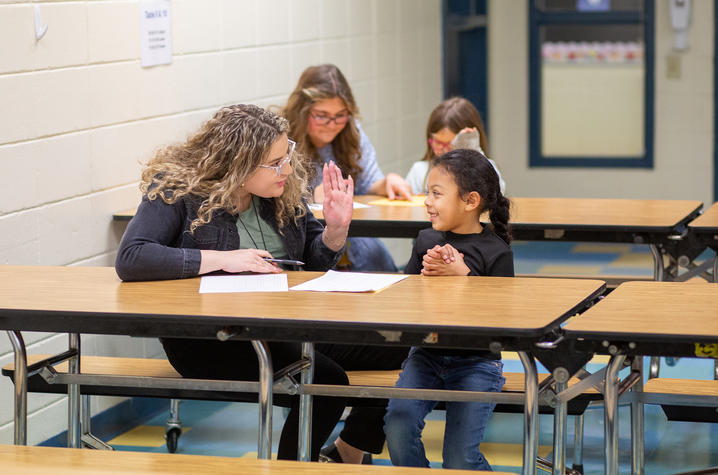Future educators gain real-world experience assessing students

LEXINGTON, Ky. (March 31, 2025) — University of Kentucky College of Education students recently gained hands-on experience giving students assessments at two Fayette County elementary schools — Picadome and Garden Springs.
By studying assessments in class and practicing with peers, the UK elementary education majors were well-prepared to make the school visits beneficial for all involved.
“Having preservice teachers administer the CORE Phonics Survey was a win-win,” said Joey Sheroan, principal of Garden Springs Elementary. “Our teachers benefit from the data this assessment provides around key phonics skills, while the future educators gain invaluable hands-on experience with administering the assessment and data interpretation. Most importantly, our students win because teachers can drill down to target individual student skill deficits.”
Averie Brownell, a UK senior from Campton, Kentucky, said working with students was more authentic than practicing with a classmate, with new factors to consider, such as young students’ reactions to being assessed.
“When the students got nervous, we could practice encouraging them to try their best,” she said.
Ariana Sanchez, a UK senior from Lexington, practiced with a friend the night before.
“I have learned a lot from my professors, especially the explanation behind why we do assessments, but practicing with the students allowed us to practice what we learned in class in an authentic setting,” Sanchez said.
Tiffany Cook, principal of Picadome Elementary, said that is why the school welcomes pre-service teachers into its classrooms.
“As educators, we know that real learning and growth happen in the classroom — through interactions with students and by observing other teachers,” Cook said.
Jonathan Thomas, Ph.D., professor and chair of STEM Education and acting chair of the Department of Curriculum and Instruction, said the experience helps aspiring teachers learn to respond to students’ needs and adapt when needed.
“These are important learning experiences for preparing our students for success as educators,” Thomas said.
Several UK students said they were nervous before starting the assessments, but that soon changed.
“Our students are very responsible and felt nervous because they didn’t want to make any mistakes with the kids,” said Ozge Yalciner, Ph.D., assistant professor of literacy. “At the end, after they got through the experience, they said it was great. This is the third week of our semester and our students will be embedded in schools after this, so it was nice for them to see what’s happening right now in the schools.”
When planning visits to schools, UK faculty ask principals what areas of focus they want the students to prioritize.
“We are very responsive to what the schools want,” said Joni Meade, elementary education clinical instructor. “They identify their needs and we prepare our students to meet them. Today, Garden Springs needed us to look at phonics data. At Picadome, they wanted fluency, sight word and spelling data.”
Yalciner said assessments are a great tool, but they take time.
“Our students gave over 500 literacy and mathematics assessments, in one day, from 8 a.m. to 1:30 p.m.,” Meade said. “This included knocking out the entire kindergarten’s letter/sound recognition inventories in 45 minutes, running records for about 90 fourth graders, and emergent word study inventories and math assessments for the first grade. As a teacher in a classroom, you are constantly pulling students to do assessments and might get only a few completed each day. So, this freed up instructional time for the teachers.”
Teachers analyze every error a student makes on an assessment and use that information to help students overcome any skill deficits.
“Assessments are time-consuming, but they tell you so much,” Meade said. “Our students enjoyed this experience and the opportunity to make an impact.”
Brownell and Sanchez will complete their student teaching in the fall, putting them one step closer to making an impact in a classroom of their own.
“I knew from a very young age I loved being in school and playing teacher,” Brownell said. “Growing up, my mom did foster care and, hearing their stories, I wanted to be a reason students love coming to school and a reason they have something to look forward to.”
Sanchez realized teaching was in her future during an 8th grade trip her Spanish immersion program took to Costa Rica. As they visited schools, she wanted to get to know each student.
“After that I just knew I wanted to be a teacher and help the kids that I could, no matter the circumstances,” she said. “I think they all have the ability to do amazing things.”
As the state’s flagship, land-grant institution, the University of Kentucky exists to advance the Commonwealth. We do that by preparing the next generation of leaders — placing students at the heart of everything we do — and transforming the lives of Kentuckians through education, research and creative work, service and health care. We pride ourselves on being a catalyst for breakthroughs and a force for healing, a place where ingenuity unfolds. It's all made possible by our people — visionaries, disruptors and pioneers — who make up 200 academic programs, a $476.5 million research and development enterprise and a world-class medical center, all on one campus.




